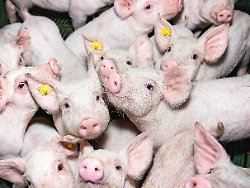Monday, December 6th, 2021
5D rule from 2022
Soon only German pork at Aldi and Lidl
Germany’s pig farmers are in crisis. The fact that in the future the big discounters only want to offer meat that is produced entirely in Germany and that also meet higher animal welfare standards in the long term offers a perspective – but also a challenge.
The discounters Aldi and Lidl have announced that in future they will only sell pork that has been produced entirely in Germany. Lidl only wants to offer so-called 5D pork in the course of the first quarter of 2022. This means that the animals in Germany are born, raised, fattened, slaughtered and cut up. Long transports of piglets or fattening pigs for slaughter should be avoided in this way. In addition, the trading groups want to strengthen the German pig producers, which are currently under great pressure, according to their own statements. Aldi Nord and Süd announce the switch to 5D by the fourth quarter of 2022.
Both discount chains also want to ban pork from their range in the long term, the production of which does not correspond to at least the level three or four. This means that the animals either have exercise in the open air or at least have a fresh air climate in the barn with significantly more space than the minimum legal requirement.
The German pig producers are in a deep crisis. Germany is one of the largest producers of pork and the leading exporter. But world market prices have collapsed mainly because of the rampant swine fever. At the same time, costs are increasing, for example for animal feed. The discounters have already used this for massive discount campaigns in the past few months. The companies emphasize that they bought the meat at higher than the collapsed market prices.
With their commitment to a completely domestic production chain and increasing animal welfare requirements in the long term, the discounters in Germany are creating a medium-term perspective of rising standards and prices. So far, meat from higher rearing levels or from organic production has been a niche product in Germany. In order to meet these requirements, however, the farmers have to invest a lot of money, for example in converting the stables. Above all, many smaller family businesses do not see themselves financially in a position to do this in view of the current crisis.
